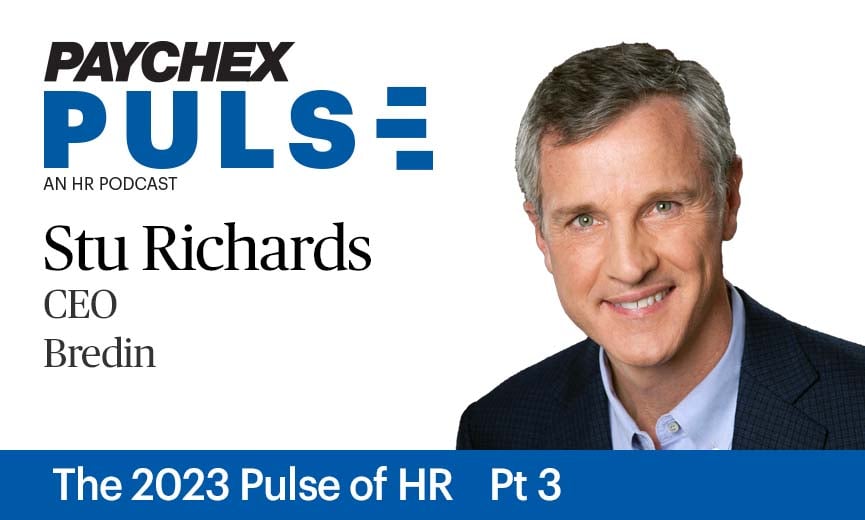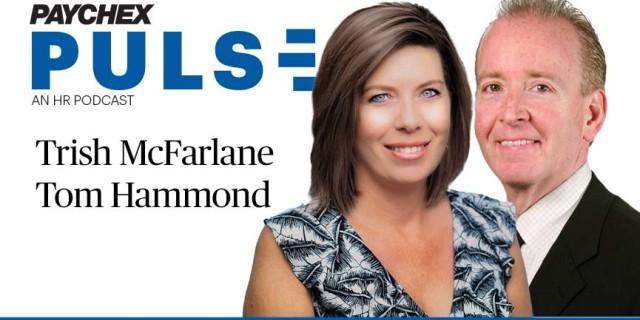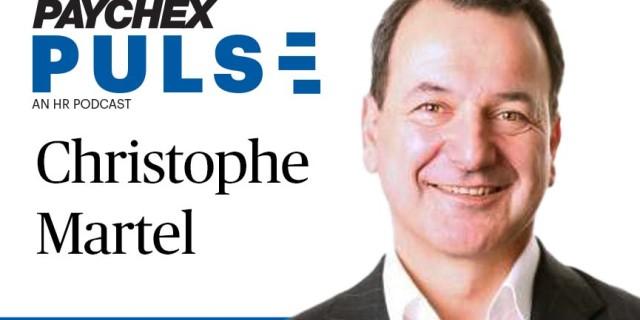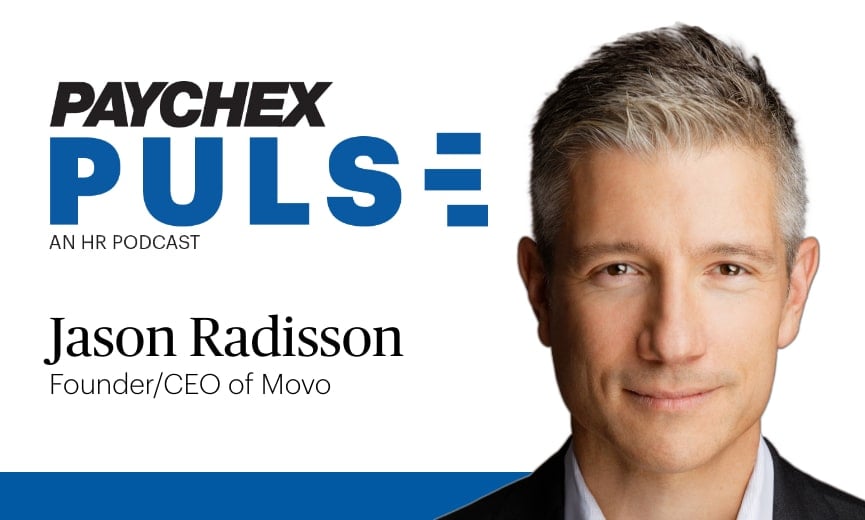Meeting the Needs of Every Generation: Taking the Pulse of HR in 2023 - Part 3

Podcast •

Vea
Resumen
Como conclusión de nuestro análisis del 7.o Informe anual Pulso de Recursos Humanos, el presentador Rob Parsons conversa con Stu Richards, CEO de Bredin Research, sobre cómo los empleadores se dirigen a cada generación para atraer y retener a los mejores talentos. Conéctese para informarse sobre los nuevos beneficios que los responsables de RR. HH. pretenden implementar durante el próximo año para atraer a los empleados de todas las edades.
Los temas incluyen:
00:00 – Welcome Stu Richards
00:21 – The important of HR tech and communication
01:37 – Attracting and retaining talent by generation
03:07 – Flexibility as an employee benefit
03:35 – Current benefits trends
05:42 – Using benefits to promote employee wellbeing
06:38 – Payroll as an employee benefit
07:35 – The ongoing importance of DEI
09:43 – Final thoughts on the 2023 Pulse of HR
11:19 – Wrap up
Download the 7th Annual Pulse of HR Report.
Watch, listen, and explore episode 1 and episode 2 of this series.
Get to know the newest generation to enter the workforce a little better with our special report on the rise of Gen Z.
Discover the right Paychex solutions for your HR needs.
Ver transcripción
Rob Parsons (00:00):
Hi all, welcome back to the Paychex PULSE podcast. Rob Parsons here. This is episode three of three focusing on the Pulse of HR survey we just conducted with Bredin. Joining me today is Stu Richards the CEO of Bredin Research. Stu, thanks for coming back.
Stu Richards (00:16):
Rob, it's great to be here.
Rob Parsons (00:17):
I'm glad you're patient enough and willing to come three episodes with me here.
Stu Richards (00:20):
It's my pleasure.
Rob Parsons (00:21):
So today I wanted to talk about the specifics around employee experience and specifically some of the things HR leaders are trying to do to get the most out of their workforce. And of course, we know it starts with talent management, technology, and communication. So, just share a little bit of what you saw there around that talent management story?
Stu Richards (00:42):
Sure, Rob, in the survey that we just did, talent management really jumped out as an important issue to both HR leaders and business leaders. And fundamentally we see it's going to be built on two pillars, technology and communication. And the tools that we're seeing respondents rely on most are improving recruitment to support company goals, using technology to boost HR leader personal productivity which I touched on a little bit in episode two, communicating plans and successes to management teams, and mitigating burnout via education and benefits. And I mentioned a little bit, one of the concerns that came up was employee burnout. So, we see HR leaders in particular really focused on what can they do to minimize that on the part of their workforce.
Rob Parsons (01:34):
Huge, huge issue for sure.
Stu Richards (01:36):
Yeah absolutely.
Rob Parsons (01:37):
You looked at current tactics, you took a 12-month window to see what people were doing to attract and retain talent. What was interesting, I shouldn't, I don't think it should be a surprise, but it varied by generation.
Stu Richards (01:48):
It did, it did. It was interesting. So, what we saw worked best was a variety of tactics, but communicating company mission was most important to basically everyone after Gen Z, the youngest workforce. Communicating company mission was really important and for Gen Z workers, it was really around communicating commitment to DEI, which is really interesting and it's great to see that that's as important as it is for the youngest folks in the workforce. But there were a variety of tactics that companies are using. They include training, and that's especially important as you might guess for younger employees, communicating company mission as I mentioned, onboarding effectively, so again, not just getting folks enrolled in payroll and benefits, but really understanding specifically what their tasks are, what they need to do to succeed, how they're going to meet goals. DEI, as I mentioned, benefits, and we'll talk a little bit about that, but really interesting to see which direction those are going in over the next 12 months. And then also flexible scheduling is really important for all generations but especially for folks who have childcare or other kind of family responsibilities, a really important way to attract and retain employees.
Rob Parsons (03:07):
I think that's a key point, and we've touched on a little bit this flexibility about where I work, but there's a dimension of the flexibility of when I work as well, that really needs to come into play, isn't it?
Stu Richards (03:18):
Yes, yeah, very much. And we do see companies making a lot of accommodations to attract the right kind of employees and again, using technology as best they can to really make flexible work, whether it's by time or location, work as effectively as possible.
Rob Parsons (03:35):
I know oftentimes we bring flexibility in as a benefit, which I guess it could be perceived as, and certainly a low-cost benefit if handled correctly. But when you dug into benefits, the big three, health, dental, retirement — they showed up again — but after that, I thought there was some differences in this list from years past, probably reflecting changes in the current work environment. Tell us a little bit about what happened to benefits after the traditional big three?
Stu Richards (04:06):
Yeah, it was interesting, Rob. Yeah, we saw a lot of interest. About four in 10 companies are interested in expanding benefits for physical and financial wellbeing and self-care and wellbeing training. Meaning not just providing benefits that help you with your emotional or physical or financial wellbeing but also educating employees on why they should be taking advantage of those and really making sure that you're not just offering them, but you're really getting people to enroll in those kinds of programs. And yeah, health, dental, retirement, as you mentioned also parental leave, we were kind of interested. I think that's moved up a little bit on the list of benefits over the past couple years. For the next 12 months as we look forward to what companies are going to be adding, EAP programs, again in the health and wellbeing category are really important. Shorter work week, so really being flexible around work arrangements. So, it's not just, again as you mentioned, where, but when they can work. Daycare cost assistance, which is a huge financial hit potentially to many workers and seeing companies step up with that. Obviously, a lot of companies understand the importance of that. Financial counseling, as well. Helping folks with budgeting, basically an understanding, what can they spend, what do they need to put away for the long-term. Elder care and HRE programs, we saw those as having the highest kind of purchase propensity over the next 12 months.
Rob Parsons (05:42):
It's, I find so interesting, it maybe some of it plays into burnout, maybe some of it plays into just how many demands are put on people, leaders, and employees alike, but EAP and parental leave, and childcare, I mean, these are all really important issues. It's interesting that it's falling on businesses now to really help with that. Is it because those, some of those resources just aren't obviously available? Outside my professional life.
Stu Richards (06:09):
Yeah. I think it really is Rob. Yeah, it does. It speaks to, definitely cultural challenges, but yeah, I think a lot of companies are seeing the need on the part of their employees for these services and they're really stepping up and it's wonderful to see that they actually are doing that. And I'd like to think it's not just for a mercenary, we're optimizing productivity, but, genuine concern for the wellbeing of their employees.
Rob Parsons (06:38):
Another benefit, one we're obviously interested in, and seeing evolve and change before our eyes, is just how pay models are changing. What did you see there?
Stu Richards (06:47):
We saw a lot there. It was really interesting. And using pay kind of creatively as almost a competitive benefit. So obviously, most employees are getting direct deposit and how frequently that happens, might be subject to change from company to company, but we saw a lot more use of pay cards and 24/7 real-time payments, or earned wage access, really has become important. And pay-on-demand is, I think really important for folks where if you're really managing a tight budget being able to get daily, or even a couple times within a day pay, can be a huge advantage to you as both an employee, but also as a company looking to attract a workforce.
Rob Parsons (07:35):
It's a big deal and I think we're going to see a lot of evolution in that in the coming years. DEI is something we've talked a lot about, we know it's a huge differentiator particularly in younger generations. What did you see different in the survey? I feel like maybe business and HR leaders weren't looking at it maybe as intently as employees were.
Stu Richards (07:56):
Yeah, it is interesting. And what's really interesting to see the difference in importance of DEI across the generations. So, for Gen Z and millennials, it's really important to them. That's the kind of culture in which they want to work. For older employees, it's not necessarily their top concern, but making sure that a company demonstrates — communicates, but also demonstrates — its commitment to DEI is really important regardless of who it is that you're employing or looking to recruit. But we really saw companies, making a sincere effort to implement DEI. And for millennials, we saw an effective way that they want to see DEI implemented is pay equity. So, they really want to make sure, across gender, across race or background. And for bigger companies, they wanted to see inclusion. So not just talking the talk, but really walking the walk and making sure that for example, every level within your organization has good representation. For Gen Xers, they were also interested in pay equity and inclusion, but they also wanted to see pay increases across the board. For Gen Z, they wanted to see diversity in the bigger companies with 100 to 500 employees. But it was interesting, Rob, where for younger employees, again, it's really important for organizations to communicate and to demonstrate commitment to DEI, it's just an essential part. It's table stakes for recruiting these days.
Rob Parsons (09:36)
It really it speaks to the culture. As you mentioned, I want to work at a place that's like that.
Stu Richards (09:41):
Yeah, absolutely.
Rob Parsons (09:43):
So, we have just a couple minutes. I'm going to give you a chance just to step back one last time and give me that 30,000-foot view. What was the big takeaway or what should people really think about with this research?
Stu Richards (09:56):
Well, I think there were two, Rob, it was really interesting. And the first was just a repeated concern that welled up around the wellbeing of employees. And again, I think it's a genuine affection on the part of employees for their employers, for their employees and making sure that they're doing well and can contribute to the organization as well as they can. And recognizing how fundamentally COVID has affected the wellbeing of a lot of people over the past couple of years. So, the focus on wellbeing, through either flexible work arrangements or through the benefits that are evolving, was really consistent theme. And the other thing of course, was the adoption of technology to support, again, whether it's a hybrid team and with workers wherever they happen to be or working whenever they happen to be. And as kind of a subtopic within technology, the rapid adoption of AI, which we think is just going to absolutely explode and lead to some really interesting changes in the workforce. But hopefully, the upskilling of a lot of folks and some very significant increases in productivity and hopefully wellbeing.
Rob Parsons (11:15):
It'll be interesting to see what we see in the survey next year, right?
Stu Richards (11:18):
Yes, it will.
Rob Parsons (11:19):
Stu, well thank you so much for joining the podcast. This was great.
Stu Richards (11:22):
Yeah, Rob, it's a pleasure, thanks for having me.
Rob Parsons (11:24):
And thank you all for joining and listening. As I mentioned before, you can find the survey in our show notes. Thank you once again, please stay happy and healthy. Be sure to subscribe to this and our Paychex THRIVE business podcast on your favorite podcast platform. Looking for more ways to keep your finger on the pulse of industry dynamics? Visit our resource center for the latest research, thought leadership, and news at paychex.com/worx. That's W-O-R-X. Thanks again for joining us. Until next time, please stay happy and healthy.
Announcer (12:01):
Este pódcast es propiedad de Paychex, Incorporated 2023. Todos los derechos reservados.

 Apple Podcast
Apple Podcast Spotify
Spotify iHeartRadio
iHeartRadio









